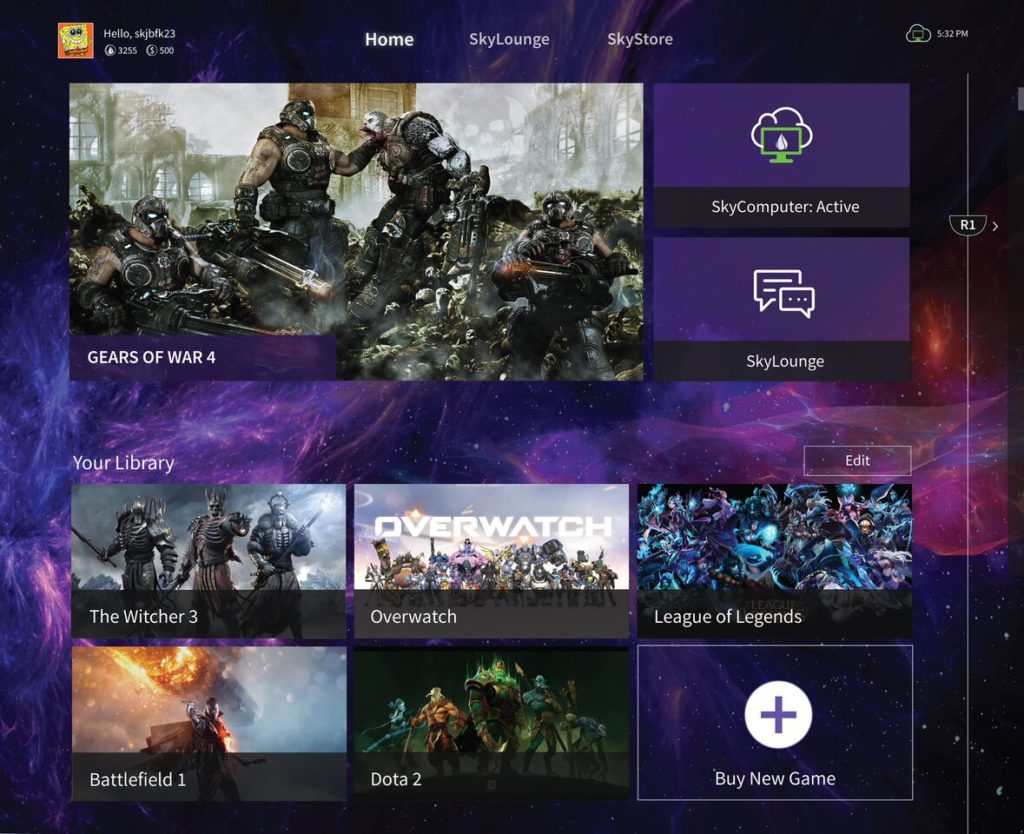At CES 2017, LiquidSky offered a hands-on with its new cloud-based gaming platform that allows high-end PC games to be played on any Android, Mac, Linux and Windows devices. The company also unveiled a new free-to-play model that launches worldwide in March 2017.
Ian McLoughlin, founder and CEO of LiquidSky, told [a]listdaily that this ad-supported model offers gamers access to a free gaming SkyComputer that can be used to access game libraries across Steam, Origin, Battle.net, UPlay, and Windows Store.
“This is the first time anyone has ever made a free gaming PC,” McLoughlin said. “You still need a thin client to access it, but so many devices can plug into a TV through thin client today that it’s very accessible.”
LiquidSky will be launching its own think client hardware later this year, offering gamers another way to connect with its SkyComputer.
The ad-based business model lets gamers earn Sky Credits currency by watching commercials and they can use those credits to purchase time to access a cloud-based gaming PC. It takes watching six minutes of ads to earn 60 Sky Credits, which equates to an hour of time on the base service. McLoughlin said the exact currency exchange is still being tweaked.
“We don’t want the user to have to watch a bunch of ads to earn an hour,” McLoughlin said.
Gamers can earn up to three hours of free access per day plus 100GB of SkyStorage to save games in the cloud. Any unused Sky Credits roll over.
Over 1.1 million gamers have already signed up for the beta with the majority of sign-ups (75 percent) from word-of-mouth referrals. League of Legends, Battlefield 1 and Overwatch are among the most popular games on the service today.
McLoughlin said the ad-supported model works because of the large number of gamers that can concurrently play on a single server, thanks to the company’s proprietary technology. This will enable a traditional ad-supported model with spots earning eCPMs for companies that advertise to this gaming audience.
Gamers can also choose a pay-as-they-go model that starts at $4.99 per hour with 100GB of storage and monthly subscriptions begin at $9.99 with one terabyte of storage.
Users can play online with nearly no latency, which allows for a smooth gameplay experience. LiquidSky has built 14 data centers in 13 regions around the world, which circumvents an issue that OnLive ran into when they tried cloud gaming.
“People have said OnLive would have succeeded if it had the right games, but they featured mostly indie games and then ‘AAA’ games a year after release. On top of that, latency was always an issue. They were ahead of their time.”
One of the main reasons LiquidSky will remain in beta is to continue to get all aspects of the system working, including the advertising model and a safe ecosystem for game publishers and developers to deliver content. After all, LiquidSky is renting out a gaming PC, not the games themselves.
“We had to find a way to bridge to existing gaming content out there like Netflix did with DVDs to prove people would stay at home and then have online streaming,” McLouglin said. “Our bridge is Windows Server 2016, so you can get access to the cloud. It’s a persistent computer for each user.”
LiquidSky has also created a container service for developers to upload their game and have it protected on the back-end.
“There hasn’t been a single traditional DRM game that hasn’t been cracked completely,” McLoughlin said. “We want to help game developers. Our container is drag and drop and no code is exchanged. The game can be built for Linux, Android or Windows and we automatically put the game in a LiquidSky application. There’s complete protection because users can never access the binaries of the game. It’s also great for game companies because they don’t need to worry about download costs.”
The platform also supports open API, allowing game developers to push out instantaneous updates to users with the need to download anything.
“We can make it seamless across one platform and allow a lot more people access to the game beyond people who have hardware to run the game on the PC,” McLoughlin said.
McLoughlin said a lot of beta users are college students and they’re using the service on MacBook Airs.
“While college kids are the current beta audience, moving forward we want this to be a way to an actual gaming platform by making it easier to use and driving the cost of using this service so low that it’s more affordable than an Xbox or gaming PC,” McLoughlin said. “People are going to say we’re being too ambitious, but we’re hopeful we can some day take on the traditional console makers.”
Samsung, Nvidia, Microsoft and IBM are strategic partners for LiquidSky.

